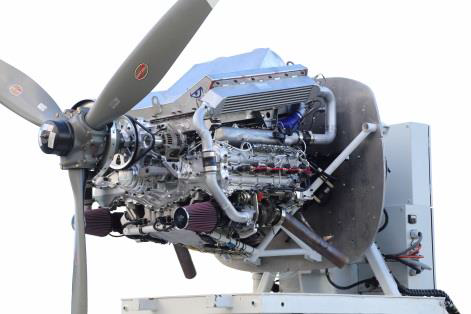3 min read
ENGINEERED PROPULSION SYSTEMS LEVERAGES CGI FOR DIESEL AVIATION ENGINE
By: John Smith on Dec 21, 2015 8:00:00 AM

[New Richmond, Bridgnorth and Stockholm, 17 December 2015] – Engineered Propulsion Systems (EPS) has uniquely leveraged the strength and stiffness of Compacted Graphite Iron (CGI), together with a ‘flat V’ engine design, to establish a new benchmark for general aviation applications. Based on a CGI cylinder block, the 4.3 litre, eight-cylinder design results in a compact, low profile engine package that provides ease of installation, durability and low aerodynamic drag. The use of CGI enabled EPS to engineer a clean sheet Aviation Diesel engine that is setting new standards in weight, size, reliability, and most importantly, fuel consumption. Initial testing of the pre-production engine has demonstrated specific power of 105 horsepower per litre (77 kW/l), resulting in an output of 450 horsepower (332 kW). The installed wet weight of the 450 horsepower diesel engine package is within 45 pounds (20 kg) of alternative 350 horsepower (257 kW) air-cooled turbocharged engines currently used in aero applications.
Heralded as the potential for a new era in aviation engines, the Graflight aero diesel promises to be more fuel efficient than any general aviation engine currently on the market. The diesel combustion process, together with the design freedom provided by high strength CGI coupled with steel pistons, enable EPS to realise 30-50% lower fuel consumption and emissions compared to conventional aero engines. Flying range and payload are also increased. With the prospect that avgas (leaded aviation gasoline) will be prohibited, the ability of the EPS engine to use widely available and low cost jet and diesel fuels provides a significant global growth opportunity. Engine and flight tests are currently underway and EPS expects Federal Aviation Authority approvals during 2017. With series production awarded to the Grainger & Worrall foundry in the UK, using the SinterCast process control technology, the engine is intended for use in single and twin engined aircraft, small helicopters, unmanned military aircraft, and potentially marine applications.
“Building on our design experience with automotive diesel engines, we knew that Compacted Graphite Iron was the optimal material for the crankcase of our Graflight V8” said Mr Michael Fuchs, President of EPS. “The aero-engine industry has been relying on outdated engine technology and fuels for more than 20 years. Our use of modern technologies such as CGI, steel pistons, common rail fuel injection and electronic engine control form the basis of our competitive advantage, our contribution to the aviation industry, and our market opportunity. Our partnerships for the supply of critical components and technologies, with proven world class suppliers like Grainger & Worrall and SinterCast, are a key element of our ability to meet the necessarily stringent requirements set by the aviation authorities.”
Together, Mr Edward Grainger, Business Development Director at Grainger & Worrall and Dr Steve Dawson, President & CEO of SinterCast said: “we are pleased to contribute our experience from more than 10 years of joint CGI product development and the launch of more than 50 state-of-the-art CGI engine programmes to this exciting project, both for the development phase and for the future series production. The EPS engine provides a high profile application for CGI and further reinforces the benefits of CGI in demanding modern engine applications.”
Grainger & Worrall is at the global forefront of rapid prototyping and casting innovation, with services including engineering support for component design, pattern making, casting and machining. A privately owned, third generation family company, Grainger & Worrall provides prototyping and small series production solutions for complex high integrity structural castings. The Grainger & Worrall facilities cast and machine components in grey iron, SinterCast-CGI, ductile iron and aluminum for the world’s leading automotive and aeronautical companies and for demanding motorsport applications.
SinterCast is the world’s leading supplier of process control technology for the reliable high volume production of Compacted Graphite Iron (CGI). With at least 75% higher tensile strength, 45% higher stiffness and approximately double the fatigue strength of conventional grey cast iron and aluminium, CGI allows engine designers to improve performance, fuel economy and durability while reducing engine size, weight, noise and emissions. The SinterCast technology, with 44 installations in 13 countries, is primarily used for the production of petrol and diesel engine cylinder blocks and exhaust components for passenger vehicles, medium-duty and heavy-duty cylinder blocks and heads for commercial vehicles, and industrial power engine components for marine, rail, off-road and stationary engine applications. SinterCast’s series production components range from 2 kg to 9 tonnes, all using the same proven process control technology. The SinterCast share is quoted on the Small Cap segment of the Stockholm NASDAQ OMX stock exchange (Stockholmsbörsen: SINT). For more information
Founded in 2006, Engineered Propulsion Systems (EPS) is intent on setting a new standard for propeller-driven airplane engines. With more than 40 years of combined engine engineering experience between the two innovators, EPS offers a new solution for single and twin engine aircraft that provides revolutionary improvements in fuel consumption, payload, range, flight speed, durability and CO2 emissions. Based in New Richmond, Wisconsin, EPS has established a pilot manufacturing facility with expansion capability for the future series production of the Graflight V8 aero diesel engine.
Related Posts
ENGINE DOWNSIZING FEATURE ENGINE EXPO 2013
Castings solutions provider, Grainger & Worrall, is showcasing the company’s latest range of...
INDUSTRY OPEN DAY SHOWCASES ENGINEERING EXCELLENCE
Earlier this week, over 40 senior figures from the UK’s motorsport industry we treated to a rare...
Engine Castings: Thermal Efficiency & Innovation
The UK is banning all new petrol and diesel cars and vans from 2040, driving the need for smaller...
 Get in touch
Get in touch